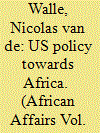|
|
|
Sort Order |
|
|
|
Items / Page
|
|
|
|
|
|
|
| Srl | Item |
| 1 |
ID:
093879


|
|
|
|
|
| Publication |
2010.
|
| Summary/Abstract |
The death of President Levy Mwanawasa in August 2008 plunged Zambian politics into a state of flux. This article argues that the way the main parties responded to the challenge of the resulting presidential by-election has three lessons to teach the emerging literature on political parties. First, Rupiah Banda's rise to power within the MMD demonstrates the extent to which intra-party machinations can leave a party saddled with an unpopular leader, and hence illustrates the great significance of succession struggles within dominant-party systems. Second, the main parties' continual repositioning of their electoral platforms reveals that not all African elections take place in an ideological vacuum, and shows that the platforms parties adopt can only be fully understood in the context of the wider party system and the way in which parties interact over time. Finally, the ability of controversial opposition leader Michael Sata to mobilize a diverse support base - by employing a 'populist' message in urban areas at the same time as receiving the support of his ethno-regional community in rural areas - lays bare the complexity of party strategies and the limits of the 'ethnic census' model of party support. Taken together, these findings suggest that the tendency to divorce the study of elections from the study of how parties function and interact impoverishes our understanding of African politics
|
|
|
|
|
|
|
|
|
|
|
|
|
|
|
|
| 2 |
ID:
093883


|
|
|
|
|
| Publication |
2010.
|
| Summary/Abstract |
This article analyses the merging of development and security in Western policies vis-à-vis 'deficient' states in the Global South, looking at the social life of anti-terror policies in Kenya. The attacks on 11 September 2001 renewed the interest in strong and stable states, leading many donors to focus on capacity building and security sector reform. In Kenya, the repressive use of these new powers by the Kibaki government has created significant resistance and the main external actors have taken the local opposition into account and have adapted their anti-terror agendas. They have complemented hard security assistance with soft interventions aimed at addressing local issues such as conflict prevention and development in communities perceived as being 'at risk' of harbouring terrorists. Representing a more general shift in security interventions in Africa, countering terrorism is now presented as part of a broader 'peace and security' agenda, but despite using new methods to engage with so-called crucial parts of the population, this repositioning is not a paradigm shift. Despite the different approaches and objectives, the various projects have ambiguous effects and donors have not abandoned the traditional rationality, which privileges homeland protection over civil rights in the recipient country
|
|
|
|
|
|
|
|
|
|
|
|
|
|
|
|
| 3 |
ID:
093881


|
|
|
|
|
| Publication |
2010.
|
| Summary/Abstract |
It has been argued that the fundamental cause of Africa's current relative poverty is a lack of pro-growth institutions deriving either from the colonial system, the period of slavery, or from particular geographic or population characteristics. This article takes a fresh look at estimates of African country incomes. It subjects the available datasets to tests of accuracy, reliability, and volatility, and finds that there is very little to explain in terms of diversity of income between countries. With the exception of some resource-rich enclaves, a few island states, and South Africa, the income of one African economy is not meaningfully different from another. It is found that the majority of African countries should for all practical purposes be considered to have the same income level. The article therefore concludes that it is futile to use GDP estimates to prove a link between income today and existence of pro-growth institutions in the past, and recommends a searching reconsideration of the almost exclusive use of GDP as a measure of relative development.
|
|
|
|
|
|
|
|
|
|
|
|
|
|
|
|
| 4 |
ID:
093878


|
|
|
| 5 |
ID:
093885


|
|
|
|
|
| Publication |
2010.
|
| Summary/Abstract |
Supermarkets are often seen as marking the transition of food economies from traditional, informal, low-quality markets to more sophisticated, quality-based modes of food retailing. Focusing on Lusaka, Zambia's capital, this article critically assesses the claim that supermarkets 'revolutionize' food economies in Africa. While supermarkets have been successful in expanding their investment reach in Zambia, the article shows that they are not the only players in the food economy, neither are they the most dominant. The article argues for a more critical engagement with supermarkets and their role in urban Africa by drawing attention to contextual changes in the local food economy and factors in the regional political economy that drive/resist the process. It argues that the 'supermarket revolution myopia' sidelines evidence of other potentially transformative processes by which the transition of food economies is made possible, and shows that 'informal' food markets, made up of complex networks of interaction, present a considerable challenge to the claims that supermarkets transform food economies in urban Africa. Transitions in the regulation, governance, and physical infrastructure of these markets suggest that they are progressively more resilient and competitive, despite the growth of supermarkets.
|
|
|
|
|
|
|
|
|
|
|
|
|
|
|
|
| 6 |
ID:
093877


|
|
|
|
|
|
|
|